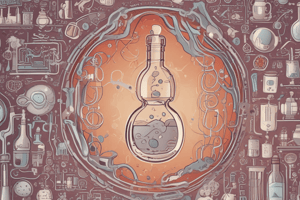Podcast
Questions and Answers
What is the primary focus of medical chemistry?
What is the primary focus of medical chemistry?
- Design, synthesis, and development of pharmaceutical compounds (correct)
- Clinical practices in healthcare
- Understanding biological systems
- Environmental impact of drugs
Which technique is commonly used in drug design to analyze the relationship between chemical structure and biological activity?
Which technique is commonly used in drug design to analyze the relationship between chemical structure and biological activity?
- Structure-Activity Relationship (SAR) studies (correct)
- High-Performance Liquid Chromatography (HPLC)
- Gas Chromatography
- Liquid-Liquid Extraction
What is an important aspect of pharmacokinetics?
What is an important aspect of pharmacokinetics?
- Examining absorption, distribution, metabolism, and excretion (correct)
- Determining the market value of drugs
- Assessing the genetic makeup of patients
- Studying how drugs affect the body
Which of the following is NOT considered a dosage form?
Which of the following is NOT considered a dosage form?
Which analytical technique is essential for quality control in drug analysis?
Which analytical technique is essential for quality control in drug analysis?
What does Good Manufacturing Practices (GMP) relate to in drug development?
What does Good Manufacturing Practices (GMP) relate to in drug development?
What current trend in drug development focuses on tailoring healthcare to individual patients?
What current trend in drug development focuses on tailoring healthcare to individual patients?
Which skill is critical for someone working in medical chemistry?
Which skill is critical for someone working in medical chemistry?
Flashcards are hidden until you start studying
Study Notes
Overview of Medical Chemistry
- Medical chemistry is the branch of chemistry focusing on the design, synthesis, and development of pharmaceutical compounds.
- It combines principles from organic chemistry, medicinal chemistry, and biochemistry.
Key Concepts
-
Drug Design
- Utilizes structure-activity relationship (SAR) studies.
- Involves molecular modeling and computer-aided drug design (CADD).
-
Synthesis of Compounds
- Involves organic synthesis techniques to create active pharmaceutical ingredients (APIs).
- Includes purification and characterization methods (e.g., chromatography, NMR).
-
Pharmacology
- Studies how drugs interact with biological systems.
- Examines pharmacokinetics (absorption, distribution, metabolism, excretion).
- Investigates pharmacodynamics (drug effects and mechanisms).
-
Drug Forms and Formulation
- Considers different dosage forms: tablets, capsules, injections.
- Involves formulation science, ensuring stability, efficacy, and release profiles.
-
Analytical Techniques
- Employs methods like High-Performance Liquid Chromatography (HPLC), Mass Spectrometry (MS), and spectrophotometry for drug analysis.
- Essential for quality control and regulatory compliance.
-
Regulatory Aspects
- Understand the process of drug approval (e.g., FDA in the U.S.).
- Comprehend Good Manufacturing Practices (GMP) and ethical considerations in drug development.
-
Current Trends
- Focus on personalized medicine and biopharmaceuticals.
- Growth of nanotechnology in drug delivery systems.
- Increased use of artificial intelligence in drug discovery.
Important Terminology
- Active Pharmaceutical Ingredient (API): The biologically active component of a drug.
- Structure-Activity Relationship (SAR): The relationship between a drug's chemical structure and its biological activity.
- Pharmacodynamics: Study of the effects of drugs on the body.
- Pharmacokinetics: Study of the absorption, distribution, metabolism, and excretion of drugs.
Applications
- Development of new therapies for diseases (e.g., cancer, infectious diseases).
- Research on vaccine development and modification.
- Investigation of drug interactions and side effects.
Skills Required
- Proficiency in laboratory techniques and instrumentation.
- Strong analytical and problem-solving skills.
- Knowledge of organic and medicinal chemistry principles.
- Understanding of regulatory and safety standards in drug development.
Medical Chemistry Overview
- Medical chemistry focuses on designing, synthesizing, and developing pharmaceutical compounds.
- It merges principles from organic chemistry, medicinal chemistry, and biochemistry.
Drug Design
- Employs structure-activity relationship (SAR) studies to understand how drug structure affects its biological activity.
- Uses molecular modeling and computer-aided drug design (CADD) to predict and optimize drug candidates.
Synthesis of Compounds
- Utilizes organic synthesis techniques to create active pharmaceutical ingredients (APIs).
- Includes purification and characterization methods such as chromatography and Nuclear Magnetic Resonance (NMR).
Pharmacology
- Explores how drugs interact with biological systems.
- Analyzes pharmacokinetics, encompassing drug absorption, distribution, metabolism, and excretion.
- Examines pharmacodynamics, investigating drug effects and mechanisms within the body.
Drug Forms and Formulation
- Addresses different dosage forms like tablets, capsules, and injections.
- Involves formulation science, ensuring stability, efficacy, and desired release profiles for medications.
Analytical Techniques
- Employs methods like High-Performance Liquid Chromatography (HPLC), Mass Spectrometry (MS), and spectrophotometry to analyze drugs.
- Essential for quality control and meeting regulatory requirements.
Regulatory Aspects
- Covers the drug approval process, such as the Food and Drug Administration (FDA) in the United States.
- Emphasizes understanding Good Manufacturing Practices (GMP) and ethical considerations in drug development.
Current Trends
- Focus on personalized medicine and biopharmaceuticals to tailor treatments to individual patients.
- Advancement of nanotechnology for drug delivery systems, enhancing targeted drug delivery.
- Increasing use of artificial intelligence (AI) in drug discovery, accelerating the process and identifying novel drug candidates.
Important Terminology
- Active Pharmaceutical Ingredient (API): The biologically active component of a drug.
- Structure-Activity Relationship (SAR): The connection between a drug's chemical structure and its biological activity.
- Pharmacodynamics: Study of the effects of drugs on the body.
- Pharmacokinetics: Study of the absorption, distribution, metabolism, and excretion of drugs.
Applications
- Development of novel therapies for diseases like cancer and infectious diseases.
- Research on vaccine development and modification for enhanced efficacy and safety.
- Investigation of drug interactions and side effects to ensure safe and effective drug use.
Skills Required
- Proficiency in laboratory techniques and instrumentation for accurate drug analysis and synthesis.
- Strong analytical and problem-solving skills for designing, synthesizing, and evaluating drug candidates.
- Comprehensive knowledge of organic and medicinal chemistry principles to understand drug structure, function, and interactions.
- Understanding of regulatory and safety standards in drug development to ensure ethical and compliant drug development processes.
Studying That Suits You
Use AI to generate personalized quizzes and flashcards to suit your learning preferences.




